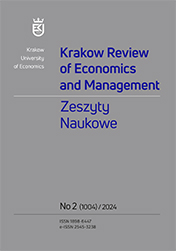Employee Retention Factors: The Perspective of Employees and Managers
DOI:
https://doi.org/10.15678/KREM.2024.1004.0206Keywords:
retention factors, retention management, assessment of the importance of retention factors, retention strategiesAbstract
Objective: The article identifies and explores differences in how employees and managers assess the importance of retention factors. It also looks at predictors of the importance employees attach to these factors.
Research Design & Methods: Literature studies and quantitative empirical research were carried out with CAWI. The research questionnaire included a self-designed WCR form and the MQSS-JSS scale.
Findings: Employees and managers differ in how they assess the importance of retention factors. Managers tend to underestimate the importance of individual factors. All of the predictors studied – company size, job satisfaction, age, gender and seniority – proved important in assessing the importance of the factors tested.
Implications / Recommendations: Research results indicate the importance of personalisation in retention strategies. Effective retention strategies should take the predictors of the importance of specific factors for employees into account.
Contribution: Managers’ tendency to underestimate the importance of retention factors has been revealed and it has been shown that the individual and organisational features tested are important predictors of factor selection in retention strategies.
Downloads
References
Bowling, N. A., & Hammond, G. D. (2008). A Meta-analytic Examination of the Construct Validity of the Michigan Organizational Assessment Questionnaire Job Satisfaction Subscale. Journal of Vocational Behavior, 73(1), 63–77. https://doi.org/10.1016/j.jvb.2008.01.004
Das, B. L., & Baruah, M. (2013). Employee Retention: A Review of Literature. IOSR Journal of Business & Management, 14(2), 8–16. https://doi.org/10.9790/487X-1420816
Dunger, S. (2023). Culture Meets Commitment: How Organizational Culture Influences Affective Commitment. International Journal of Organization Theory & Behavior, 26(1/2), 41–60. https://doi.org/10.1108/IJOTB-09-2022-0173
Dutta, A., & Banerjee, S. (2014). Study of Employee Retention. International Journal of Business Management & Research, 4(1), 83–88.
Eldridge, D., & Nisar, T. M. (2011). Employee and Organizational Impacts of Flexitime Work Arrangements. Relations Industrielles / Industrial Relations, 66(2), 213–234. https://doi.org/10.7202/1006144ar
Fuchs, R. M., Morales, O., & Timana, J. (2021). How to Retain Generation Y Employees? Journal of Small Business Strategy, 31(1), 81–88.
Galván Vela, E., Mercader, V., Arango Herrera, E., & Ruíz Corrales, M. (2022). Empowerment and Support of Senior Management in Promoting Happiness at Work. Corporate Governance, 22(3), 536–545.
Hassan, M. M., Jambulingam, M., Narayan, E. A., Islam, S. N., & Zaman, A. U. (2021). Retention Approaches of Millennial at Private Sector: Mediating Role of Job Embeddedness. Global Business Review. Advance online publication. https://doi.org/10.1177/0972150920932288
James, L., & Mathew, L. (2012). Employee Retention Strategies: IT Industry. SCMS Journal of Indian Management, 9(3), 79–87.
Khan, A. H., & Bhagat, M. (2022). An Empirical Study to Retain Good Quality Employees in Indian Firms. Iranian Journal of Management Studies, 15(3), 471–493. https://doi.org/10.22059/IJMS.2021.322863.674535
Klotz, A. C., & Bolino, M. C. (2022). When Quiet Quitting Is Worse Than the Real Thing. Harvard Business Review. Retrieved from: https://hbr.org/2022/09/when-quiet-quitting-is-worse-than-the-real-thing (accessed: 21.04.2023).
Kossivi, B., Xu, M., & Kalgora, B. (2016). Study on Determining Factors of Employee Retention. Open Journal of Social Sciences, 4(5), 261–268. https://doi.org/10.4236/jss.2016.45029
Kulisz, M. (2022). Great Resignation – geneza, skutki i polski rynek pracy. Retrieved from: https://wynagrodzenia.pl/artykul/great-resignation-geneza-skutki-i-polski-rynek-pracy (accessed: 21.04.2023).
Martini, M., Gerosa, T., & Cavenago, D. (2023). How Does Employee Development Affect Turnover Intention? Exploring Alternative Relationships. International Journal of Training and Development, 27(1), 39–56. https://doi.org/10.1111/ijtd.12282
Mehta, M., Kurbetti, A., & Dhankhar, R. (2014). Review Paper – Study on Employee Retention and Commitment. International Journal of Advance Research in Computer Science and Management Studies, 2(2), 154–164.
Pandita, D., & Kumar, A. (2022). Transforming People Practices by Re-structuring Job Engagement Practices for Generation Z: An Empirical Study. International Journal of Organizational Analysis, 30(1), 115–129. https://doi.org/10.1108/IJOA-07-2020-2294
Paździor, G. (2020). Jak walczyć o pracownika i zatrzymać go w firmie? Raport Brytyjsko-Polskiej Izby Handlowej. Retrieved from: https://www.pulshr.pl/zarzadzanie/jak-walczyc-o-pracownika-i-zatrzymac-go-w-firmie-raport-brytyjsko-polskiej-izby-handlowej,70517.html (accessed: 16.04.2023).
Pyzik, B. (2016). Jak pracownicy i pracodawcy postrzegają czynniki retencji? Opracowanie Sedlak & Sedlak na podstawie WorkSpan, Top Trends in Attraction, Retention and Motivation.
Rakhra, H. K. (2018). Study on Factors Influencing Employee Retention in Companies. International Journal of Public Sector Performance Management, 4(1), 57–79. https://doi.org/10.1504/IJPSPM.2018.088695
Randstad. (2023). Badanie Randstad: 50. Monitor Rynku Pracy. Retrieved from: https://info.randstad.pl/13489/i/monitor-rynku-pracy-50 (accessed: 17.04.2023).
Rubenstein, A. L., Eberly, M. B., Lee, T. W., & Mitchell, T. R. (2017). Surveying the Forest: A Meta-analysis, Moderator Investigation, and Future-oriented Discussion of the Antecedents of Voluntary Employee Turnover. Personnel Psychology, 71(1), 23–61. https://doi.org/10.1111/peps.12226
Samuel, M. O., & Chipunza, C. (2009). Employee Retention and Turnover: Using Motivational Variables as a Panacea. African Journal of Business Management, 3(8), 410–415.
Sharma, G. D., Mahendru, M., & Singh, S. (2010). A Study of Employee Retention in ITeS Industry: A Case of North India. Res Manageria, 1(1), 1–19.
Sharma, M. K., & Sharma, P. (2021). Exploring the Link of Psycho-social Factors and Job Environment Taking Mutual Trust as Mediator. Management and Labour Studies, 46(4), 363–378. https://doi.org/10.1177/0258042X211002505
Silva, M. R. A., Amorim Carvalho, J. C., & Dias, A. L. (2019). Determinants of Employee Retention. In: J. C. Amorim Carvalho, E. M. Sabino (Eds), Strategy and Superior Performance of Micro and Small Businesses in Volatile Economies (pp. 44–56). IGI Global.
Sinha, C., & Sinha, R. (2012). Factors Affecting Employee Retention: A Comparative Analysis of Two Organizations from Heavy Engineering Industry. European Journal of Business and Management, 4(3), 145–162.
Skowron-Mielnik, B., & Bor, M. (2015). Generacyjne uwarunkowania retencji pracowników w kontekście elastyczności organizacji. Management Forum, 3(3), 44–55. https://doi.org/10.15611/mf.2015.3.06
Witkowska, D., Kompa, K., & Matuszewska-Janica, A. (2019). Sytuacja kobiet na rynku pracy. Wybrane aspekty. Wydawnictwo Uniwersytetu Łódzkiego.
Yousuf, S., & Siddqui, D. A. (2019). Factors Influencing Employee Retention: A Karachi Based Comparative Study on IT and Banking Industry. International Journal of Human Resource Studies, 9(1), 42–62. https://doi.org/10.5296/ijhrs.v9i1.14111
Downloads
Published
Issue
Section
License
Copyright (c) 2024 Krakow Review of Economics and Management / Zeszyty Naukowe Uniwersytetu Ekonomicznego w Krakowie

This work is licensed under a Creative Commons Attribution 4.0 International License.




